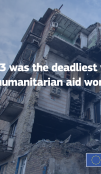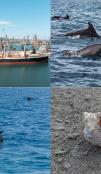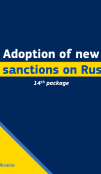Over 15,000 among the most vulnerable people supported so far in Russia during the COVID-19 pandemic

In Russia, the EU has mobilized over 13 million euro to support vulnerable groups, most affected by the pandemic. The funds channeled through Russian civil society organizations (CSOs), focus on two main strands of action: short-term assistance to address the most pressing needs, and long-term support to help people recover from the COVID-19 crisis and generate income in disadvantaged communities.
Responding to pressing needs
By now, the EU short-term assistance has reached over 15,000 people.
Through the Russian NGO Charity Aid Foundation CAF, the EU has been providing direct support to 4147 people most affected by the pandemic – elderly people living alone and in institutions and people with disabilities across Russia. Since June 2020, CAF distributed 48 micro-grants to Russian CSOs in the regions, including in remote areas. This allows the provision of social services such as home visits, medical support, direct assistance in daily living and provision of food and medicines.
The COVID-19 pandemic has made refugees and migrants among the most vulnerable groups. The EU-funded project, implemented by the Civic Assistance Committee, assists migrants and refugees with food, shelter, and provide them with medical services, thus reducing risks of poverty, infection and homelessness. So far, it assisted 1048 persons, including single mothers. Being a large group of beneficiaries, 404 children received humanitarian assistance, since large families with children faced especially difficult conditions during the pandemic. The Committee with the EU support has delivered 916 sets of food products to targeted households of refugees and migrants in Moscow and the Moscow Region. In addition, 75 families received accommodation allowances reducing their risk of homelessness.
The EU-funded project “Kovcheg is always on hand” provided a basket with food products, personal supplies and technical means of rehabilitation to 108 households of wheelchair users in the Kaliningrad Region.
A psychologist of the Online Crisis Management Service provided 247 consultations distantly to wheelchair users on various questions. Moreover, 16 specialists received training on providing home support care to patients with special needs.
Four healthcare institutions in the Kaliningrad Region got 34 units of barrier free access equipment, including sanitary installations, wheelchairs and ramps.
With temporarily closure of schools and community centers due to COVID-19, children and youth with disabilities have continued their education online, often facing major ICT challenges. With EU support, the Russian NGO Perspektiva provided IT equipment, tablets and materials for creative work to more than 500 children and youth with disabilities in 23 cities of Russia. This allowed children and youth to continue their education while at home and to stay connected with their peers.
Channeled through the NGO Doctors to Children, the EU funds ensured timely response to escalation of domestic violence with provision of emergency support services for women and girls survivors of violence. The NGO provided 8345 online counselling sessions for not only women and girls, but also men and boys.
Furthermore, 188 women and girls received a combination of services such as emergency accommodation, food and hygiene kits, transportation for women and legal assistance.
Tackling lasting consequences of the pandemic
Launched in 2020, the long-term support actions aim at increasing employment opportunities in the regions through financial support, training courses, work practice and developing social entrepreneurship. These projects also address lasting challenges posed by the pandemic and will continue until 2023.
Finally, new projects will be launched in March 2021 to ensure continued and enhanced provision of services by local CSOs to the most vulnerable groups - elderly people, people living with disabilities, children without parental care, homeless people, migrants and refugees.
More information:
EU solidarity with people in need in Russia





